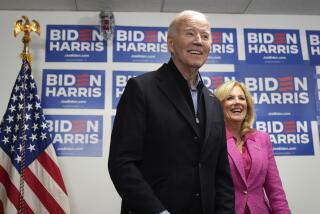One McCain Attack Ad Turned Off S.C. Voters
- Share via
Illustrating the unpredictable business of negative campaigning, one wrong move by insurgent John McCain on the airwaves contributed to his loss in last weekend’s South Carolina primary, while a slashing response by George W. Bush worked just fine.
Voters in droves said in exit polls that they felt McCain ran a more negative campaign than Bush, although he only briefly aired one 30-second ad indirectly comparing his foe to President Clinton. By comparison, Bush blanketed the state with millions of dollars worth of advertising attacking McCain. An array of religious and conservative special interest groups joined Bush in the fray.
Experts say that even if McCain hadn’t run the ad, he still might not have won the conservative, traditionally Republican state.
But, like the infamous “Willie Horton” ad that savaged Democratic contender Michael S. Dukakis in 1988, or the “Daisy” commercial against Barry Goldwater that ran one time in 1964, a single ad that ran for three days could come to symbolize how and where a presidential campaign went astray.
“This is similar to those [commercials], except this one is self-inflicted,” said Blease Graham, who taught political science at the University of South Carolina for 25 years. “It was a great ad, but in South Carolina it really rallied support around the accused rather than the accuser.”
McCain’s communications director, Dan Schnur, said voters reacted negatively because they expected more from McCain, who had promised not to stoop to mudslinging.
“The same ad from another candidate would have barely raised an eyebrow,” he said.
The problem wasn’t that McCain ran a negative ad, but that “it was a bad negative ad,” said former GOP operative Rich Galen, author of an Internet political column called mullings.com.
Its worst mistake was trying to paint Bush as Clintonesque: “Do we really want another politician in the White House we can’t trust?”
By trying to link Bush with Clinton in a state where Republicans were already worried about McCain challenging the status quo, the ad backfired, Graham said. McCain courted Democrats and independents in the state’s open primary, giving the impression that he was “inviting Democrats and independents to take over the Republican Party,” Graham said.
Galen said the ad’s message should have portrayed McCain as the victim, “not a simpering victim, but a ‘let’s play fair here’ victim.”
The spot was prepared after J. Thomas Burch, head of a national Vietnam veterans group, made a speech with Bush at his side saying McCain “came home [from Vietnam] and forgot about us.”
Bush refused to criticize Burch, infuriating McCain, who spent 5 1/2 years as a POW in Vietnam. Then Bush put up an ad accusing him of not telling the truth about his tax plan.
Many of McCain’s advisors urged him to respond with a negative ad. They pointed to Dukakis, who lost ground in his presidential race after failing to reply to attacks.
McCain initially resisted but changed his mind, and the ad hit the airwaves Feb. 8. Bush, in a response ad, asked McCain in wounded tones to stop attacking his integrity.
Within days, McCain’s poll numbers started dropping, and the ad was dissected relentlessly by national media. McCain yanked the ad, but the damage was done.
The Bush ad responding to the McCain attack is now running in California and elsewhere, but McCain’s supporters say the tactic could backfire.
“The Bush people did a very good job of playing victim in South Carolina, but no one in the next round of primary states has ever seen the [McCain] ad,” Schnur said.
More to Read
Sign up for Essential California
The most important California stories and recommendations in your inbox every morning.
You may occasionally receive promotional content from the Los Angeles Times.










